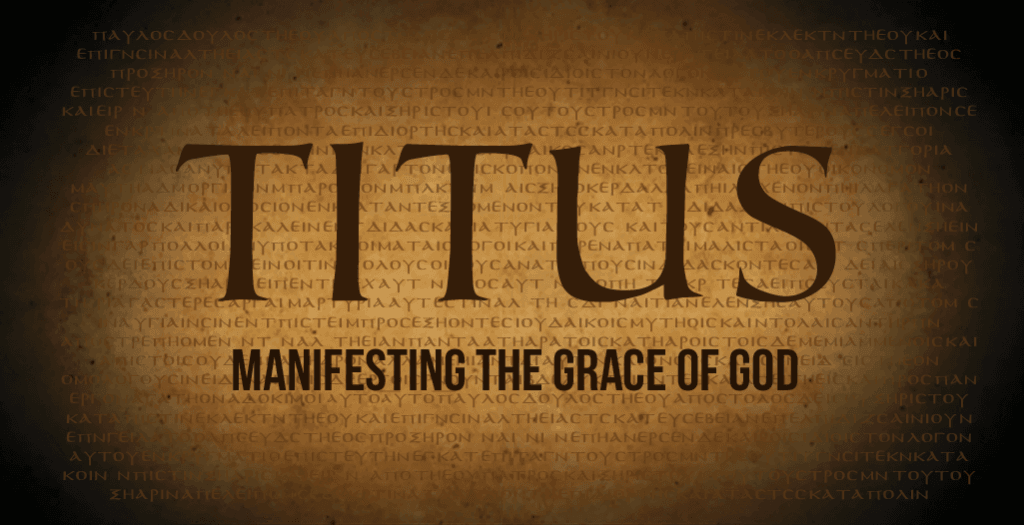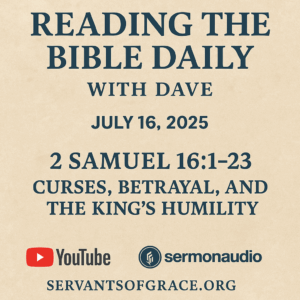⏱️ Estimated Reading Time: 8 min read
 Editor’s note: The purpose of this series is to walk through the book of Titus and learn what the Lord would have to teach us through this great book.
Editor’s note: The purpose of this series is to walk through the book of Titus and learn what the Lord would have to teach us through this great book.
- Dave opened the series on Titus by looking at the first four verses.
**************************************************
Earlier this year I was having a conversation with a friend who’s an elder at a local church in my area. During this conversation, I made the comment that the only reason he was able to meet the qualifications for an elder and keep remaining qualified as an elder is because of the gospel. Elders exist on account of the gospel. Paul instructs Titus to “appoint elders in every town” (v.5) The final culminating mark of an elder is that he is someone who cherishes “the trustworthy word as taught”—that is, the gospel, with all the “Sound doctrine” (v.9) that unpacks the gospel. Elders are gospel, men.
Titus 1:5, “ This is why I left you in Crete, so that you might put what remained into order, and appoint elders in every town as I directed you— “
In order that congregational life in the various cities of Crete may flourish, well-qualified elders must be appointed, “This is why I left you in Crete, so that you might put what remained into order, and appoint elders in every town as I directed you”.
Evidently, on a certain journey by sea Paul and Titus had been together in Crete. The gospel had been proclaimed, little groups of disciples had been gathered, meeting places had been arranged, but no official organization had been effected, or, if anything worthy of this name had been initiated, it had been left far from finished.
After a lengthy absence from his friends the apostle was anxious to see the old familiar faces and to revisit the churches previously established. He loved his Lord and longed to promote the good cause in every possible way. Moreover, he had made what might be considered promises of early visits (Philemon 22; Phil. 1:25-26). Accordingly, for Paul himself, a lengthy delay in Crete was out of the question. Nevertheless, in Crete the business of organization the various churches was far from finished, and undue haste in appointing men to office was contrary to Paul’s principles (1 Tim. 3:6; 5:22).
The solution was: Paul must be on his way, and Titus must be left behind (II Tim. 4:13, 20) on the island to straighten out the things that remained to be done, to establish presbyteries. The apostle, who likes to stress the fact that God does not leave his work of grace unfinished (Phil. 1:6; 1 Thess. 5:23), is a true imitator of God also in this respect; for Paul, too, abhors unfinished business (I Tim. 1:3 and 1 Thess. 3:10). And with respect to Titus one could almost say that for him no task was too difficult to be attempted and no challenge too formidable to be met, in dependence on divine strength and wisdom.
The text implies that the apostle had given directions as to just how elders must be appointed. This refers to the requirements for the office which must be considered in appointing men to office. Since the verses which follow refer only to elders, it is clear from 1 Timothy 3 that it was Paul’s conviction that a church would also need deacons, we may assume the apostle means that when the work to be done became too heavy for the elders, deacons should be appointed similarly (Acts 6:1-6).
Accordingly, the directions as to the requirements for the office of presbyter or elder are here re-stated. They had been given orally while Paul and Titus were still together in Crete, and they are now repeated in written form: “This is why I left you in Crete, so that you might put what remained into order, and appoint elders in every town as I directed you”.
Titus 1:6-9, “if anyone is above reproach, the husband of one wife,[a] and his children are believers[b] and not open to the charge of debauchery or insubordination. 7 For an overseer,[c] as God’s steward, must be above reproach. He must not be arrogant or quick-tempered or a drunkard or violent or greedy for gain, 8 but hospitable, a lover of good, self-controlled, upright, holy, and disciplined. 9 He must hold firm to the trustworthy word as taught, so that he may be able to give instruction in sound[d] doctrine and also to rebuke those who contradict it.”
The list of requirements for elders or presbyters is introduced by the words “If anyone is”. We have here another instance of abbreviated discourse. Here as in 1 Timothy 6:10 it is not difficult to fill in the implied words. The meaning as required by the preceding context, is, “If anyone is blameless, etc…, he can be appointed, or a person can be appointed if he is, etc.
The requirements listed here fall into three groups:
The person who is going to occupy such an important post must be of deservedly high reputation and of marriage (which will generally be the case) a good family man (verse 6). He must not be the type of person who in his desire to please himself has lost interest in other people and who, if embroiled in a quarrel, is ever ready with his fists. A list of negative characteristics is given: qualities which the overseer must not have (verse 7). All his actions must give evidence to the fact that both in deed and in doctrine he wishes to be a blessing to others. A list of positive characteristic is given: qualities which the overseer must have (verses 8 and 9).
The three groups of requirements pertain to people who as to their age and dignity are called elders, and as to their task are called overseers. Though it is true that the text has the singular “the overseer,” this “the” is generic, one member representing the entire class from the point of view of a definite characteristic. One might paraphrase the meaning as follows, “For any overseer, by reason of the very fact that he should live up to his name of overseer and should manage God’s own house, (being God’s steward), must be blameless,” etc. That for the author of the Pastorals the term elder and overseer indicate the same person also follows from the fact that essentially the same requirements for an elder are given here in Titus 1:5-6—that he be blameless, one wife’s husband, and have well-behaved children—are listed with reference to the overseer in 1 Timothy 3:2, 4.
“Blameless” means to be called to account (particularly with respect to the points to be mentioned in Titus 1:6-9). In 1 Timothy 3:2 has the same meaning with the word above approach referring to elders/overseers and deacons in 1 Timothy 3:10. “One wife’s husband” means faithful in the marriage relationship. 1 Timothy 3:2 also refers to one’s wife husband when speaking of elders/overseers, and deacons in 1 Timothy 3:12.
“His children are believers” means having children who share the Christian faith of their fathers and who adorn that faith with godly conduct. A man whose children are still pagans or behave as pagans must not be appointed elder (Ephesians 5:18). A married man who doesn’t have children is not disqualified from being an elder because of his lack of children. 1 Timothy 3:4-5 refers to managing well his own household, with true dignity keeping his children in subjection. A deacon must manage well his children and his household (1 Timothy 3:12). The elder must not be arrogant towards others (1 Timothy 3:2; II Peter 2:10).
Elders must not be “quick-tempered” meaning given to outbursts of wrath, and not given to blows, nor contentious (1 Timothy 3:3). “A drunkard” means who is not addicted to alcohol. “Violent” means not eager to use his fists, not bellicose, not spitfire. “Greedy for gain” means not an embezzler, pilferer, not fond of money (Titus 1:11; 1 Timothy 3:3;1 Peter 5:12), “Hospitable” here means ready to befriend and to lodge the destitute, traveling, or persecuted believers (1 Peter 4:9; 1 Timothy 3:2). “A lover of good” means to love, goodness, virtue, and ready to do what is beneficial to others. “Self-controlled” means being of a sound mind, discreet, sane (Titus 2:2, 5); 1 Timothy 3:2). “Holy” has in mind performing one’s duty before God. “Upright” speaks to performing one’s duty toward man. “Disciplined” means possessing the moral strength to curb or master one’s sinful drives and impulses (Genesis 39:7-9; 50:15-21).
“Hold firm to the trustworthy word as taught” means clinging to and applying himself to the sacred tradition which is in harmony with the sound doctrine, that is, with the doctrine which, in turn, is based on Scripture. “so that he may be able to give instruction in sound doctrine and also to rebuke those who contradict it” speaks to the end that every overseer may be able by means of his sound teaching to incline will and heart to the joyful service of God, and to expose the errors of those who rebel; that is, to withstand these opponents, if at all possible bringing them to an acknowledgement of their error and to repentance; at least, convincing believers that these adversaries are wrong. Not all the overseers or elders are actually called upon to perform this task (1 Timothy 5:17), but all must be able to perform it (1 Timothy 3:2).



